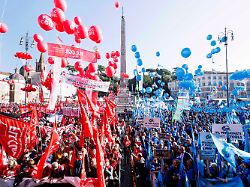A general strike in Italy turns into a power struggle between trade unions and the right-wing nationalist government. In order not to lose out, the unions appeal to Prime Minister Meloni. Because at the center of the dispute is someone else.
“Adesso basta!”, now it’s over, that’s the motto of the general strike that filled the Piazza del Popolo in Rome today with people and red and blue flags. The unions CGIL and UIL called for this. The strike was originally aimed at protesting against the 2024 budget law and a series of promises made by Prime Minister Giorgia Meloni’s government that the unions felt were not kept. The strike has now become a harsh and fundamental confrontation.
The general strike was scheduled to last eight hours and affected public services: from local and long-distance transport to schools, hospitals, fire departments and garbage collection. The unions are demanding higher salaries and pensions, a renewal of collective agreements, the abolition of discrimination against women in the labor market, and generally a policy for the younger generation and job security.
Salvini wanted to steal the show from Meloni
The fact that the strike escalated is primarily due to Lega leader Matteo Salvini, one of the junior partners in Meloni’s right-wing coalition. Salvini is deputy prime minister and transport and infrastructure minister. In order to steal the show from the Prime Minister, at least for a few days, he is turning the general strike into a major showdown with the unions.
Salvini had asked the leaders of CGIL and UIL, Maurizio Landini and Pierpaolo Bombardieri, to limit restrictions on trains and public transport to four hours in the morning. Since the unionists refused, Salvini turned to the parliamentary commission, whose task is to ensure that the legally established right to strike is not curtailed. The commission agreed with Salvini on the grounds that it was not a real general strike – among other things because the private sector was excluded from it.
When the union nevertheless insisted on the eight hours in local and long-distance transport, Salvini threatened to oblige the employees to show up at work. He got his way: Landini and Bombardieri announced on Wednesday that they would limit the strike in the two areas to four hours.
From the unions’ point of view, the right to strike is in danger
If the unions had opposed the minister, not only would they have had to expect a fine of up to 100,000 euros, every unruly worker would also have faced a fine of up to 1,000 euros. “We would have taken a chance,” said Landini, “but we didn’t want the workers to pay for a right they were entitled to.”
The unions consider Salvini’s reasons for threatening to compel him to work – a measure that is normally only used in emergencies or because public safety requires it – to be particularly questionable. Bombardieri listed some of the ministry’s written justifications: “Tourism in our country, the ever-increasing traffic on the roads and, as we are talking about two of the main unions, the likely large turnout.”
Landini described Salvini’s actions as an attack on the Italian constitution, in which the right to strike is enshrined. Bombardieri in turn referred to a development that has actually been observed for some time: members of the current government often use a very harsh tone in public conflicts.
“We’re not scared!”
Here too, Salvini is usually at the forefront. Alluding to the scheduling of the strike on a Friday, he said the strikers “want to set up a long weekend.” He also accused Landini and Bombardieri of making politics under the guise of the workers’ movement.
While Landini called on Meloni from the stage to defend the right to strike and listen to the workers, Bombardieri Salvini replied: “We don’t belong to any party. And yes, we do politics, namely union politics.”
One of the slogans addressed to the government today was: “We are not afraid!” But the unions are already worried that this government will continue to try to restrict the right to strike in the future. Salvini has shown that it can be done.
